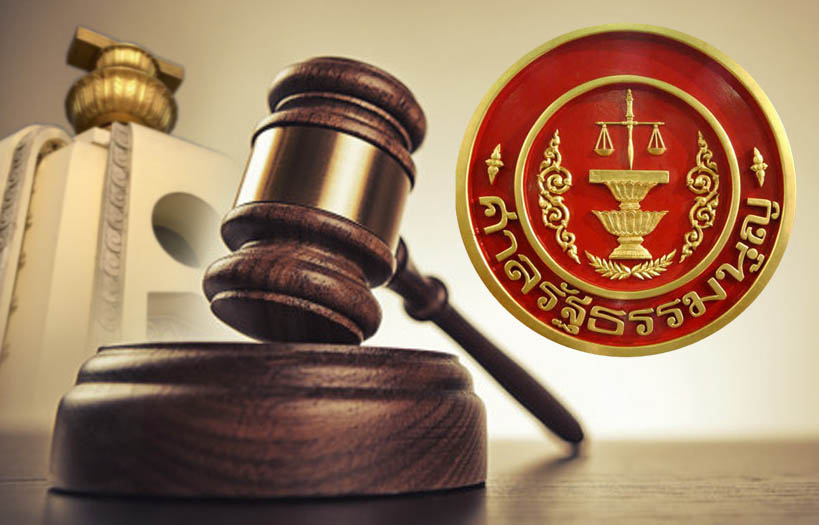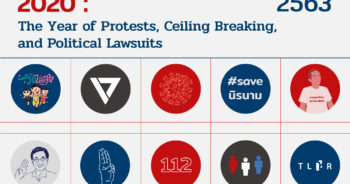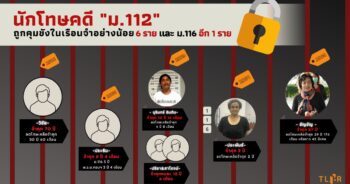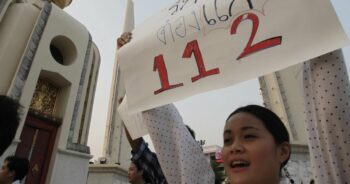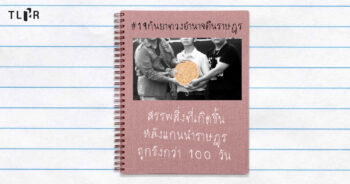On 7 August 2024, pursuant to a petition from the Election Commission of Thailand, the Constitutional Court ruled (Case No. 10/2567) to dissolve the Move Forward Party. The petition from the Election Commission stemmed from several factors, including:
- the party’s proposal and campaign to amend Section 112 of the Criminal Code;
- the party’s MPs acting as bail guarantors for suspects in Section 112 cases; and
- individuals facing Section 112 charges running as MP candidates for the party in the May 2023 election.
The Court determines that such acts are tantamount to an attempt to overthrow the system of government, and can be characterized as a hostile act against the democratic form of government with the King as the Head of State, pursuant to Section 92, para. 1(1) and (2), of the Organic Act on Political Parties B.E. 2560 (2017). The Court also banned Move Forward Party’s executive committee members from holding political office for ten years.
As an organization which provides legal assistance to people who are prosecuted for exercising their right to freedom of expression, Thai Lawyers for Human Rights (TLHR) is concerned about the potential impact of this ruling, as well as the previous Ruling No. 3/2567 by the Constitutional Court, particularly on issues concerning Section 112 of the Criminal Code:
1. Proposing a bill to amend Section 112 of the Criminal Code is a permissible campaign policy and a legitimate aspect of the legislative process. The Constitution of the Kingdom of Thailand B.E. 2560 (2017) has established rules to ensure the constitutionality of a bill both before and after the bill is proposed. Interpreting the proposal of a bill as an attempt to overthrow the system of government is an overreach and could be seen as an encroachment on the legislative province through the exercise of judicial power. Such encroachment undermines the separation of powers doctrine, which is a cornerstone of democratic governance.
The proposed amendments to Section 112 of the Criminal Code merely offers recommendations on the appropriate content and punishment for the offense of defaming, insulting, or threatening the King, the Queen, the Heir-apparent, or the Regent. It does not affect the “status” of the monarchy, which is addressed separately in Chapters 1 and 2 of the Constitution of the Kingdom of Thailand B.E. 2560 (2017). Between February 2018 and November 2020, during which Section 112 was not enforced and no penalties were meted out thereunder, the monarchy continued to function effectively and remain secure to this day.
2. By acting as a guarantor in a criminal case, regardless of the offense, the guarantor ensures that the suspect or defendant will not abscond and will attend all hearings until the proceedings are concluded. In the worst-case scenario, if the suspect or defendant flees, the guarantor is only required to either locate and return the individual to court or pay a fine equivalent to the bail amount set by the court.
The Constitutional Court’s assessment of Move Forward Party MP’s acting as guarantors as conduct aimed at overthrowing the system of government is detrimental to the criminal justice process. If acting as a bail guarantor to facilitate the right to bail is considered an offense, individuals would be deterred from participating in the justice process in this capacity. Furthermore, it would deprive suspects or defendants of their right to a fair trial, as they would be held in prolonged detention while their cases are still ongoing. In so doing, they would be treated like individuals who have been convicted by a final judgment, thereby violating the principle of presumption of innocence.
3. The Constitutional Court’s ruling to dissolve the Move Forward Party may not have a direct impact on the bail situation of over 27 suspects involved in Section 112 cases, the rulings of Section 112 cases, and the ongoing campaign for political amnesty.
However, it is undeniable that the ruling will exacerbate the already shrinking civic space. Additionally, these rulings could be cited in ongoing trials and the lèse-majesté offense may be interpreted in a manner that contradicts democratic principles. They will also further complicate efforts to campaign for the amendment of Section 112 to ensure its compliance with democratic principles.
4. The UN Working Group on Arbitrary Detention (WGAD), a special procedure under the UN Human Rights Council, on which Thailand is running for a seat in the October 2024 election, has consistently held that deprivation of liberty of persons under Section 112 constitutes arbitrary detention. The WGAD states that arbitrary detention violates Articles 3 and 9 of the Universal Declaration of Human Rights and Article 9(1) of the International Covenant on Civil and Political Rights (ICCPR). Since 2012, the WGAD has issued similar opinions on at least ten individuals detained arbitrarily under Section 112, including its 10th opinion on Ms. Tantawan Tuatulanon.
Thai Lawyers for Human Rights (TLHR) believes that the proposed amendment to the Criminal Code aiming to limit the administrative power to file cases and reduce punishments proportionately is not an attempt to overthrow the ruling system but rather a step towards guaranteeing freedom of expression in Thailand. This proposal aligns with the Concluding Observations of the UN Human Rights Committee, which called for Thailand to review Section 112 of the Criminal Code to bring it in compliance with ARticle 19 of the ICCPR, and calls by UN experts to repeal Section 112.
TLHR believes in the right to freedom of expression and that people should be able to voice their concerns, criticize, and campaign for amendments or repeal of laws that impact their rights and freedoms, including Section 112 of the Criminal Code.
Therefore, the Constitutional Court’s ruling is a significant violation of democratic principles, potentially pushing Thailand towards a political system that is unable to adapt and respond to public opinions and changes in a modern world.
.
With respect to the people’s rights and freedoms,
Thai Lawyers for Human Rights
.
